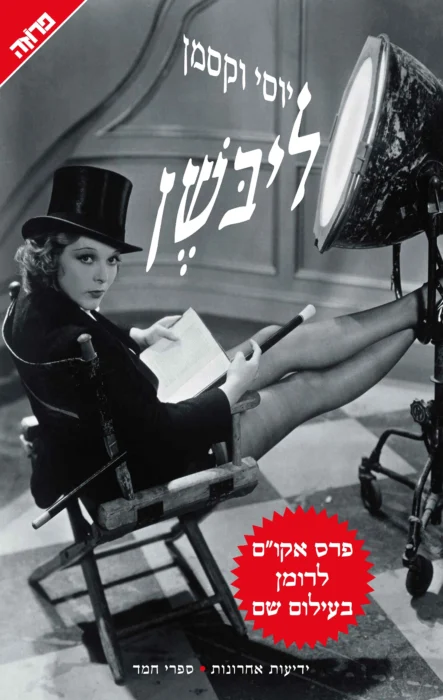Please scroll down for an English review.
יש ספרים שאני מסיימת אותם ולא מצליחה למצוא מילה טובה אחת לומר עליהם. ליבשן הוא ספר כזה. הרעיון הבסיסי שלו, אהבה רומנטית בין גבר בן ארבעים נשוי ומצליח לבין אישה בת שמונים ניצולת שואה שנושאת עבר מצמית של קאפו ומאהבת של מפקד מחנה, הוא בעיניי לא רק מופרך אלא גם פוגע.
החלקים שמתארים את סיפור חייה של גבריאלה כנערה בת שבע עשרה במחנה השמדה הם חומר עוצמתי שמסוגל לעמוד בפני עצמו. אלו סיפורים שמזעזעים מטלטלים ויכלו להיכתב באופן שהיה עושה חסד עם הדמות האומללה שלה. אבל וקסמן בוחר לעטוף את זה בסיפור אהבהבים חסר אמינות שהופך את הדמות לגרוטסקית.
מירי פז כתבה בגלובס על הבעיה של הספר:
"אין בו איזון בין הביזארי לבין האנושי האוניברסלי. לא אחת נופל וקסמן במלכודת של קברט דקדנטי שבו הדמויות מאבדות את אנושיותן והופכות לקריקטורות. זה קורה בפרקים שגדושים ביותר מדי אירועים יותר מדי דמויות יותר מדי צבעים צורמים. לא ברור מדוע רומן אחד צריך להכיל בתוכו גם קאפו "טובת לב" גם מאהבת של נאצי גם אב הומוסקסואל אבוד מניו זילנד גם מאהב עיראקי גם אם חולת נפש וגם רעיה חלולה ששמה אהבה."
בסופו של דבר התחושה היא של החמצה גדולה. כי בתוך כל זה מסתתר סיפור בעל עוצמה אמיתית, סיפור על נערה יהודייה שנאלצה לשרוד בתנאים בלתי נתפסים ועל המחיר הנפשי הבלתי נסבל שמלווה אותה עד זקנתה. במקום לאפשר לסיפור הזה להיות במרכז וקסמן עטף אותו בפרוזה מתפרעת בניסיון לעורר הלם או בידור ויצר ספר שנדמה לעיתים אכזרי כלפי דמותו של הקורבן.
התוצאה היא לא רומן שמעורר מחשבה אלא חוויה צורמת של פאתוס מוגזם. במקום אנושיות קיבלתי קברט. במקום חמלה קיבלתי קריקטורה.
ליבשן/ יוסי וקסמן
הוצאת ידיעות ספרים, 2004, 256 עמ'
דירוג SIVI –
איכות אודיו –

Some books leave me speechless, without a single good word to say. Libshen is one of them. Its central premise, a romantic relationship between a forty-year-old married man and an eighty-year-old Holocaust survivor who carries with her the unbearable past of being both a camp kapo and the mistress of a Nazi commander, feels not only implausible but deeply disturbing.
The parts that recount Gabriela’s life as a seventeen-year-old in a death camp are powerful enough to stand on their own. These stories are devastating and could have been told in a way that honored her tragic character. But Waxman chooses to wrap them in a forced and unbelievable love affair that strips the character of her dignity and renders her grotesque.
As critic Miri Paz wrote in Globes, the novel fails to strike a balance between the bizarre and the universal human experience. Too often, Waxman falls into the trap of decadent cabaret, overloading the narrative with too many events, too many characters, too many exaggerated details. Why does one novel need a “kind-hearted kapo,” a Nazi lover, a long-lost homosexual father from New Zealand, the father’s Iraqi lover, a mentally ill mother, a borderline grandmother, and a hollow wife named “Love”?
The result is a sense of profound missed opportunity. Because within all this excess lies a story of actual power: a Jewish girl forced to survive in unthinkable circumstances and the unbearable psychological toll she carried into old age. Instead of allowing this story to take center stage, Waxman cloaks it in sensationalist prose, attempting to shock or entertain, and ends up producing a novel that often feels cruel toward its own victim.
The outcome is not a thought-provoking work but a grating spectacle of overblown pathos. Where there should have been humanity, there is cabaret. Where there could have been compassion, there is caricature.
לגלות עוד מהאתר Sivi's Books
Subscribe to get the latest posts sent to your email.

